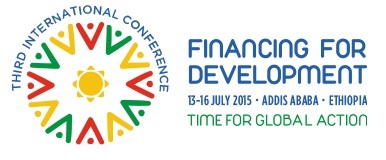The second drafting session on the outcome document of the Third International Conference on Financing for Development (FfD 3) focused on reviewing the zero draft of the outcome document, the Addis Ababa Accord, circulated by Co-Facilitators George Talbot, Permanent Representative of Guyana, and Geir Pedersen, Permanent Representative of Norway.
 17 April 2015: The second drafting session on the outcome document of the Third International Conference on Financing for Development (FfD 3) focused on reviewing the zero draft of the outcome document, the Addis Ababa Accord, circulated by Co-Facilitators George Talbot, Permanent Representative of Guyana, and Geir Pedersen, Permanent Representative of Norway.
17 April 2015: The second drafting session on the outcome document of the Third International Conference on Financing for Development (FfD 3) focused on reviewing the zero draft of the outcome document, the Addis Ababa Accord, circulated by Co-Facilitators George Talbot, Permanent Representative of Guyana, and Geir Pedersen, Permanent Representative of Norway.
The drafting session took place at UN Headquarters, New York, US, from 13-17 April 2015. Delegates took up the zero draft’s sections on a global framework for financing sustainable development, and mobilizing the means to implement the post-2015 development agenda, as well as the Addis Ababa Action Agenda, including its eight sub-sections: domestic public finance; domestic and international private business and finance; international public finance; international trade for sustainable development; debt and debt sustainability; systemic issues; technology, innovation and capacity building; and data, monitoring and follow-up.
The organizational arrangements of the drafting session were discussed several times during the week, with the Group of 77 and China (G77/China) calling for line-by-line intergovernmental negotiation, with the text projected on a screen and reflecting comments and changes. However, other Member States and Groups supported a general discussion on the zero draft, to be followed by a revised draft. As a compromise, the text was projected on a screen while delegates made comments, but did not capture the comments made on each section. Going forward, it was agreed that a document compiling all the comments submitted would be prepared, in addition to a revised draft prepared by the Co-Facilitators.
On the last day of the session, the Co-Facilitators of the post-2015 development agenda negotiations, Macharia Kamau and David Donoghue, addressed the meeting. Highlighting the universality and ambition of the post-2015 agenda, Kamau emphasized the expectation that FfD 3 will link directly to the post-2015 agenda, by addressing means of implementation (MOI) for the Sustainable Development Goals (SDGs),including through commitments to implement the post-2015 agenda over the next 15 years. Donoghue said a joint session between the FfD 3 and post-2015 processes was scheduled for the following week to address, inter alia: coherence between the two processes; a briefing on options for a technology facilitation mechanism; and an interactive dialogue with stakeholders.
In the brief discussion that followed, Brazil proposed a checklist to track how the FfD 3 outcome draft is addressing the SDG targets. Switzerland read a cross-regional statement from over 30 countries, highlighting gender equality and women’s empowerment as not only the right thing to do, but also “smart economics.” He welcomed the integration of gender in the zero draft, while calling for strengthened language in some sections.
Delegations are invited to submit comments on the zero draft of the Addis Ababa Accord by 22 April for compilation and distribution by the beginning of May. Thereafter, the Co-Facilitators will propose a revised draft based on this compiled text.
Ahead of the third drafting session in June 2015, two intersessional consultations are being planned, on 11-13 May, and 26-29 May.
The FfD 3 conference will convene in Addis Ababa, Ethiopia, on 13-16 July 2015. [IISD RS Meeting Coverage]